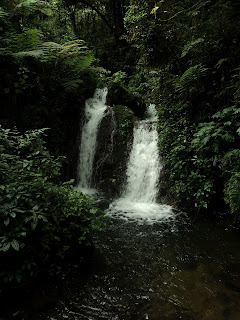The voyage was fraught with peril from the moment we entered the bus. The driver was drunk. Not the normal, sucking down a packet of konyagi (the local, terrible terrible gin. It comes in individual plastic packets.) or chewing on a bit of murungi (some sort of illegal substance, I believe it's a plant related to the alkaloids, caffeine, cocaine, and nicotine, an one periodically sees bus drivers chewing them) high, but a man with a carton of "juice" that mysteriously was refilled at every stop, and at every stop, the hairpin turns up the mountain became more wild until we were catching air. The journey ended prematurely at a washed out bridge. Buses could not pass from one side to the other and waited one either side of the muddy impassable area of the road, while passengers trudged the 2km from one bus to the other. Our party located a passing safari land rover containing tourists in what can only be described as safari chic. They were too good to let us in their car, but they did let us stand on their running boards and hold onto their luggage rack all the way to the next bus. They also took pictures of us hanging off their car. Why, I do not know.
At long last we reached Bwindi Impenetrable National Forest, site of a huge government scam to bilk innocent tourists of their money. First, the only food at the camp site was a flat $15 regardless, and the only cafe right outside the camp charged almost 8k Ugandan shillings for a plate of rice and meat, and was out of beans and vegetables, and running out of rice. To put this into perspective, a typical local meal should be about half that price and it should be rice, beans, and vegetables plus a meat. Fortunately, we had crackers, oreo filling in a squeeze tube courtesy of nice people in the US who love us, and peanuts are always cheap. When those ran out, there was a village about 20 minutes down the road where we could get reasonable food at a fair price.
 |
| monkey trap! |
Now I will to a certain extent simply accept overpriced food and drink. However, what I do not accept is the way that the gorilla tracking is conducted. The price for a permit to look at gorillas is almost $500. The guides will do their best to convince people that they should hire porters for an additional US $15 (or maybe $25? I don't remember), on the grounds that people might be hiking up steep, wet mountains all day, and are still not guaranteed to find gorillas. Guides do this knowing full well where the gorillas are. The families that get tracked are well tracked, their normal habits plotted on maps, and they move up to 1 km a day. At this particular time of the year, the gorillas hang out around the camp. The first day they were in a tea field next to the camp, the next day they were on the path to the toilets at the camp. Those who paid the $500 were paying it to walk about 100 feet from their cabins. I have never been so glad at deciding to be cheap and not go gorilla tracking. I slept in, had a leisurely tea in the village and did the Peace Corps thing where I get people to teach me tribal greetings and on the return to my cabin, I saw gorillas in the tea fields. I regard this as defrauding the government of the money they were trying to scam from me.
Were I to run this camp, assuming ethics, I would try to make it into a really nice resort place, along the lines of a swanky hotel in a nice town. With options on the menu that, while somewhat overpriced, aren't discouragingly overpriced, and try to encourage people to just hang out for several days, eating and drinking, on the grounds that seeing the gorillas seems highly likely if you just hang out for a while, and there are also many birds and monkeys and just a beautiful forest to go hiking in, though the government still charges $15 just to walk in the national forest and that can't be helped. The camp we stayed at at the Nile made lots of money off us for food just because the prices weren't so outrageous and the food was good enough we still paid, and we were happy to spend long periods of time in their restaurant looking at the river below us. Of course, as many people as show up willing and having paid the $500 and easily persuadable to pay for porters there is absolutely no reason for this camp to start a vaguely moral business model, so I don't expect them to.
The rest of the party, after going on their arduous 100 foot gorilla track while I was still in bed, went on a nature hike. I include their pictures. While I did see gorillas in the tea fields and the next day by the bathrooms, I didn't take pictures.
All the stuff immediately outside the camp was, of course, touristy. I have never seen so many hand-carved gorilla walking sticks in my life. There was also a children's dance and theater group. Not particularly good or interesting, but it was a project founded to get begging kids off the streets and get them some sort of education. We donated and watched them perform a little. It was very gorilla themed, but included odd Christian songs informing us, contrary to our pop culture education, that the king of the jungle is "Jesus!" which is startling to hear when you are fully expecting Tarzan.





















I take back my previous snarky comment about the Hemmingway-esque prose. This is way better (way!) than Papa H.
ReplyDelete